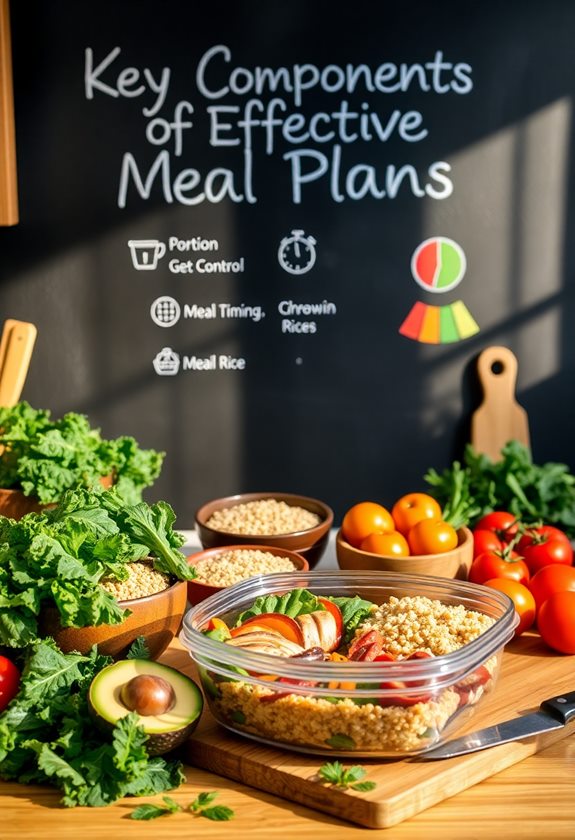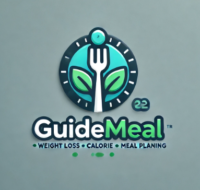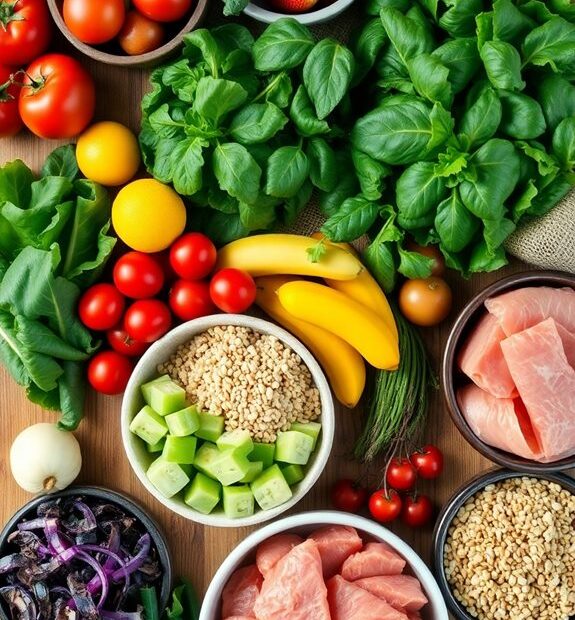Tailored meal plans are important for your weight loss journey. They help you set clear goals, like losing 10 pounds in three months, and match your eating habits with your daily life. Think about it—don't you want meals that taste good and fit your schedule? By balancing proteins, healthy fats, and carbs, you can enjoy a variety of foods without getting bored. Meal prepping also saves time, making it easier to avoid unhealthy choices. Plus, tracking your progress keeps you motivated! Doesn't it sound easier when you have a plan? Stick with us, and you'll discover more tips to succeed! 🌟
Key Takeaways
- Define specific weight loss goals to guide your meal planning and keep you focused on your journey.
- Create customizable meal plans that balance proteins, healthy fats, and carbohydrates to support overall health.
- Incorporate personal food preferences and variety to make meals enjoyable and enhance adherence to your plan.
- Prepare meals in advance to save time, reduce stress, and avoid unhealthy last-minute choices.
- Regularly track progress and be open to adjusting meal plans based on your body's feedback and changing needs.
Understanding Your Weight Loss Goals

Understanding your weight loss goals is essential for crafting an effective meal plan. Have you thought about what you really want to achieve? Whether it's losing a few pounds or making a big lifestyle change, knowing your goals helps you stay focused.
Start by asking yourself: "Why do I want to lose weight?" Is it for better health, more energy, or maybe to fit into those jeans you love? Once you identify your "why," you can set specific, measurable targets. For example, instead of saying, "I want to lose weight," try, "I want to lose 10 pounds in three months." This makes your goal clearer and easier to track.
Next, consider your current habits. Are you eating out often, or do you snack mindlessly? Understanding these patterns will help you make better choices. Don't forget to think about your lifestyle, too. Do you have time to cook every day? Finding a balance between your goals and your daily routine is key.
Benefits of Customizable Meal Plans
Another benefit is that customizable meal plans can help you manage your portions. They allow you to balance your meals with the right nutrients, making it easier to avoid overeating. Plus, you can adjust your plan as you progress. Are you feeling hungrier as you work out more? You can tweak your meals to meet your energy needs! 💪
Custom meal plans can also save you time and money. When you know what you need, you can shop smarter and reduce food waste. Ever thrown out food you didn't use? That's frustrating!
In short, a personalized meal plan empowers you to take control of your weight loss journey. So, why not give it a try? You might just find it's the perfect fit! 🌟
Key Components of Effective Meal Plans

An effective meal plan combines essential elements that cater to your individual needs and goals. First, balance is key. You want to include proteins, healthy fats, and carbohydrates in every meal. Have you thought about what foods you enjoy? This makes sticking to your plan easier!
Next, consider portions. Eating the right amount is vital for weight loss. Are you measuring your food? Using a kitchen scale or measuring cups can help you visualize your servings better.
Then, think about variety. Eating the same meals can get boring. Why not explore new recipes or seasonal ingredients? This keeps your meals exciting and satisfying.
Additionally, timing plays a role. Are you eating regularly throughout the day? Spacing out your meals can help manage hunger and prevent overeating.
How to Create Your Meal Plan
Creating your meal plan can be an enjoyable process if you approach it with the right mindset. Start by setting clear goals. What do you want to achieve? Are you aiming to lose weight, gain muscle, or simply eat healthier? Knowing your goals helps shape your plan.
Next, think about your likes and dislikes. There's no fun in eating meals you don't enjoy. Make a list of your favorite foods and include them in your plan. You can mix and match different meals to keep it exciting.
Then, consider your schedule. Are there days you're busier than others? Plan simpler meals for those days. Prepping meals in advance can save you time and stress.
Finally, make it balanced. Aim for a mix of proteins, healthy fats, and carbs. Think of your plate as a colorful canvas! 🥗
Don't get discouraged if it takes time to find what works for you. Experimenting is part of the journey. Remember, the goal is to create something that feels right for you. So, are you ready to get started? Let's make meal planning a fun adventure! 🌟
Tips for Sticking to Your Plan

Sticking to your meal plan can be the real challenge after you've put in the effort to create it. How can you make it easier? One way is to prep your meals in advance. Spend a few hours each week cooking and portioning your food. This saves time and helps you avoid last-minute unhealthy choices.
Another tip is to keep your meals interesting. Try new recipes or swap out ingredients to prevent boredom. Are you really excited about eating the same thing every day? Adding variety can make a big difference!
Stay mindful of your hunger cues. Eat when you're hungry, not out of habit. This helps you connect with your body's needs and makes sticking to your plan feel less like a chore.
Don't forget to share your journey with friends or family. Having a support system can keep you motivated. Who wouldn't want a cheerleader?
Lastly, be kind to yourself. If you slip up, don't beat yourself up. Just refocus and get back on track. Remember, it's about progress, not perfection! You've got this! 💪
Tracking Progress and Adjustments
As you begin your weight loss journey, tracking your progress is essential for staying motivated and making necessary adjustments. How often do you check in on yourself? Regularly noting your weight, measurements, and how your clothes fit can help you see the changes, even when the scale doesn't budge.
Consider keeping a journal or using an app. Write down what you eat and how you feel. This not only shows your food choices but also helps you notice patterns. Are you snacking when you're bored? This can be a sign to adjust your eating habits.
Don't forget to celebrate your victories! Did you lose a pound or fit into a smaller size? 🎉 Acknowledge those moments; they keep you motivated.
If something isn't working, it's okay to change your plan. Maybe you need more protein or fewer carbs. Listen to your body and adjust accordingly.
In the end, tracking isn't just about numbers; it's about understanding your journey. Remember, every small step counts! So, how will you start tracking your progress today?

